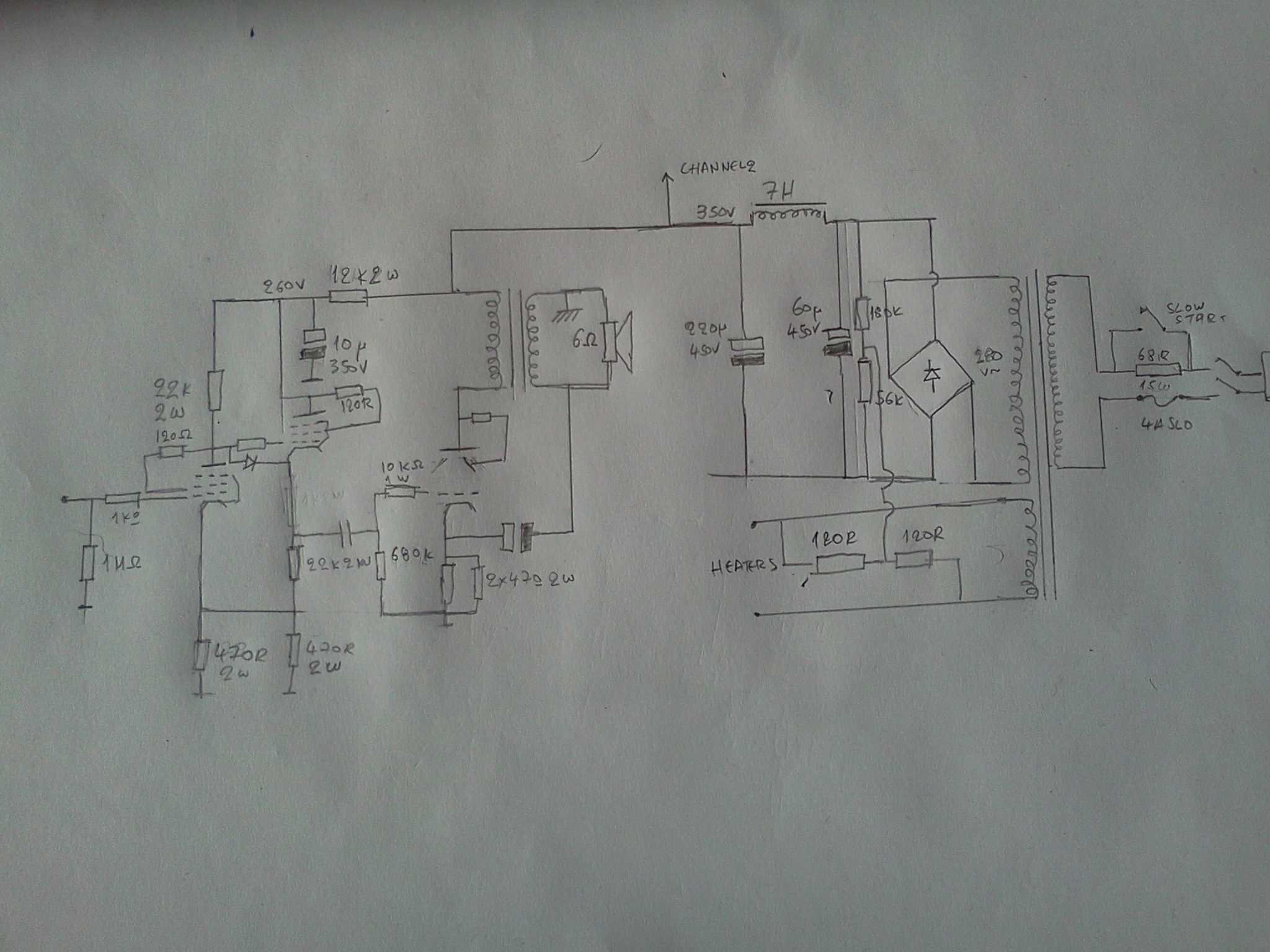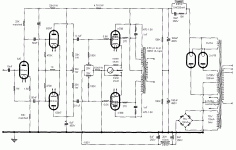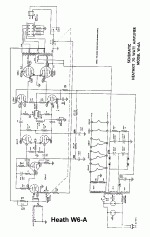I'm looking to build a simple 100W amp with readily available tubes. I came across the GEC KT88 100W ultralinear schematic which seems reasonable to my untrained eye, but I don't know about the transformers. I'll probably have to sub for the 6J5 and U19 (2x5R4WGB?). Also, I was looking at the hammond 1650RA and 373HX and I was wondering what others were using and if there were any issues with this particular design or perhaps suggestions for others.
Thanks!
Thanks!
Last edited:
I think you won't get that output/CH with todays new production without burning up a lot of tubes early. The new KT-120 or coming KT-150 would be a better tube or even PPP circuits with still those big tubes might be the most reliable.
I built an 80 watt valve amplifier using 4 EL34's on the output.
I used ECC83 on the front end for voltage gain and tone control and an ECC82 for the phase splitter.
I used a Fender 100W transformer.
I used ECC83 on the front end for voltage gain and tone control and an ECC82 for the phase splitter.
I used a Fender 100W transformer.
I think you won't get that output/CH with todays new production without burning up a lot of tubes early.
Beat the snot out of tubes and their service lives will be short. There's little reason to believe OS tubes were any different.
If this is a musical instrument amp, KT120s will be good. OTOH, the pentode mode plate curves for the type are hideous. The KT120 has serious linearity problems. Its distortion products may be euphonic, but that's not HIFI. I don't like bludgeoning a circuit with NFB to achieve respectable linearity. IMO, you start with something reasonably linear, from the very beginning. Then, a small amount of NFB to clean things up and increase damping factor finishes the job.
A reliable 100 WPC HIFI amp may be possible using PP KT88s. Take advantage of the type's rating for positive control grid current and build a Class "AB2" setup. Tubelab's PowerDrive will be needed between the phase splitter and the "finals".
GEC Also gives a Reduced voltage for the same Amp but giving about 70 watts.
The output transformer has a Lower impedance.
I made mine with 12BH7 or the Russian 6N6 to get more drive.
Modern Production KT88's can not handle 100K on the grids if you want a long life with Fixed bias.
Sowter makes out put transformers for these amps but they are expensive.
Phil
The output transformer has a Lower impedance.
I made mine with 12BH7 or the Russian 6N6 to get more drive.
Modern Production KT88's can not handle 100K on the grids if you want a long life with Fixed bias.
Sowter makes out put transformers for these amps but they are expensive.
Phil
I run a KT120 single ended ultralinear amp, driven by triode strapped EF184 small signal pentodes. I use a small amount of local cathode feedback by including the secondary of the OPT in the cathode circuit.
It sounds wonderful.
There seems to be no info on the KT120 used as ultralinear, but I did a bit of educated guesswork based on the triode curves. I have tried triode, pentode and UL.
UL sounds by far the best, followed by triode. Pentode is a long way behind.
My bias point is -40 grid volts at 90mA with 440V on the plate. This could be used in a PP output stage, but 100WPC would not be possible at these op points, as I aam only at 36W dissipation (chiefly because my James 6123H OPTs will only accept 90mA of standing DC) you'd need to be more towards class A/B operation to get big power.
Ultralinear KT120s do sound marvelous though.
It sounds wonderful.
There seems to be no info on the KT120 used as ultralinear, but I did a bit of educated guesswork based on the triode curves. I have tried triode, pentode and UL.
UL sounds by far the best, followed by triode. Pentode is a long way behind.
My bias point is -40 grid volts at 90mA with 440V on the plate. This could be used in a PP output stage, but 100WPC would not be possible at these op points, as I aam only at 36W dissipation (chiefly because my James 6123H OPTs will only accept 90mA of standing DC) you'd need to be more towards class A/B operation to get big power.
Ultralinear KT120s do sound marvelous though.
Thanks!GEC 100 watt Ultra linear.
Phil
I fully agree with what's been said already. 100W with just 2 KT88s is pushing it. Specially with todays tubes. For home audio, I'd settle for less wattage (100W is loud!) which makes for an easier build as well and reduces the number of tubes you go through in a year 😛
Edit: I'd loose the pot to balance the PI as well. That's a lot of DC going through that thing!
Edit2: I assume there's a preamp going in front of it. I've not done the calculations, but it seems impossible to drive it to full output with a line level signal.
Edit3: And the meter is nice, but adds complexity. Nothing a DMM can't do (better).
Last edited:
Drop B+, run it around 70W. About 1 dB quieter, and your tubes will last years (decades) instead of months. How efficient are your speakers?
EH KT90 (really an alias of the PL5 group) is my tack in lieu of KT88's, with a tad more heater current. The KT120 is a bully, just wanting to show-off with an Unproven history.
richy
richy
GEc KT88
the circuit I submitted is missing the voltage amp; you need to use a 6SN7 instead of the 6J5 shown; the voltage amp direct coupled to the Phase splitter.
I use 12BH7's or the Russian 6N6 instead of the 6SN7's much better drive.
A circuit for a 70 watt amp.
Phil
the circuit I submitted is missing the voltage amp; you need to use a 6SN7 instead of the 6J5 shown; the voltage amp direct coupled to the Phase splitter.
I use 12BH7's or the Russian 6N6 instead of the 6SN7's much better drive.
A circuit for a 70 watt amp.
Phil
Attachments
I'm looking to build a simple 100W amp with readily available tubes. I came across the GEC KT88 100W ultralinear schematic which seems reasonable to my untrained eye, but I don't know about the transformers. I'll probably have to sub for the 6J5 and U19 (2x5R4WGB?). Also, I was looking at the hammond 1650RA and 373HX and I was wondering what others were using and if there were any issues with this particular design or perhaps suggestions for others.
Thanks!
Use a 1650TA Hammond and four KT88's in push pull parallel for 100 - 120 watts. Two KT88's are not going to give you an honest continuous commercial rating of 100 watts in anything near class A, AB1, or even AB2 if you run the tubes within their normal range. Sure some will beg to differ with me on that. This is just from real world experience in hifi and guitar amps using this tube.
[QUOTE: Sure some will beg to differ with me on that. This is just from real world experience in hifi and guitar amps using this tube.[/QUOTE]
Nup.entirely agree.
richy
Nup.entirely agree.
richy
Not exactly the way I would do it today - but here is PPP KT88 with hammond 1650T I did quite a few years ago . The DUD120
"DUD" being a bit of fun, stands for "Down Under Designs".
Design description
1
Amp Schematic
http://www.evatco.com.au/project_files/dud120.jpg
Power Supply schematic
http://www.evatco.com.au/project_files/dud120-2.jpg
Cheers,
Ian
"DUD" being a bit of fun, stands for "Down Under Designs".
Design description
1
Amp Schematic
http://www.evatco.com.au/project_files/dud120.jpg
Power Supply schematic
http://www.evatco.com.au/project_files/dud120-2.jpg
Cheers,
Ian
Last edited:
Cool! I didn't know that was your design. I stumbled on it with google images and it helped me when I was working on my own 4xKT88 amp 😀. So, thanks for that.Not exactly the way I would do it today - but here is PPP KT88 with hammond 1650T I did quite a few years ago . The DUD120
"DUD" being a bit of fun, stands for "Down Under Designs".
Design description
1
Amp Schematic
http://www.evatco.com.au/project_files/dud120.jpg
Power Supply schematic
http://www.evatco.com.au/project_files/dud120-2.jpg
Cheers,
Ian
Member
Joined 2009
Paid Member
I run a KT120 single ended ultralinear amp, driven by triode strapped EF184 small signal pentodes. I use a small amount of local cathode feedback by including the secondary of the OPT in the cathode circuit.
I've had some interest brewing in building something with cathode feedback - I'd be interested if you wanted to share more (via PM maybe) such as how to choose a suitable transformer ?
I've had some interest brewing in building something with cathode feedback - I'd be interested if you wanted to share more (via PM maybe) such as how to choose a suitable transformer ?
here's a schematic with cathode feedback...I am currently rebuilding
Attachments
Have you thought about SEUL? Not going to get you 100w/ch but you may like the results. There are many that do!
Cheers,
Bob
Cheers,
Bob
I've had some interest brewing in building something with cathode feedback - I'd be interested if you wanted to share more (via PM maybe) such as how to choose a suitable transformer ?
Here is another

- Status
- Not open for further replies.
- Home
- Amplifiers
- Tubes / Valves
- KT88 Ultralinear?

